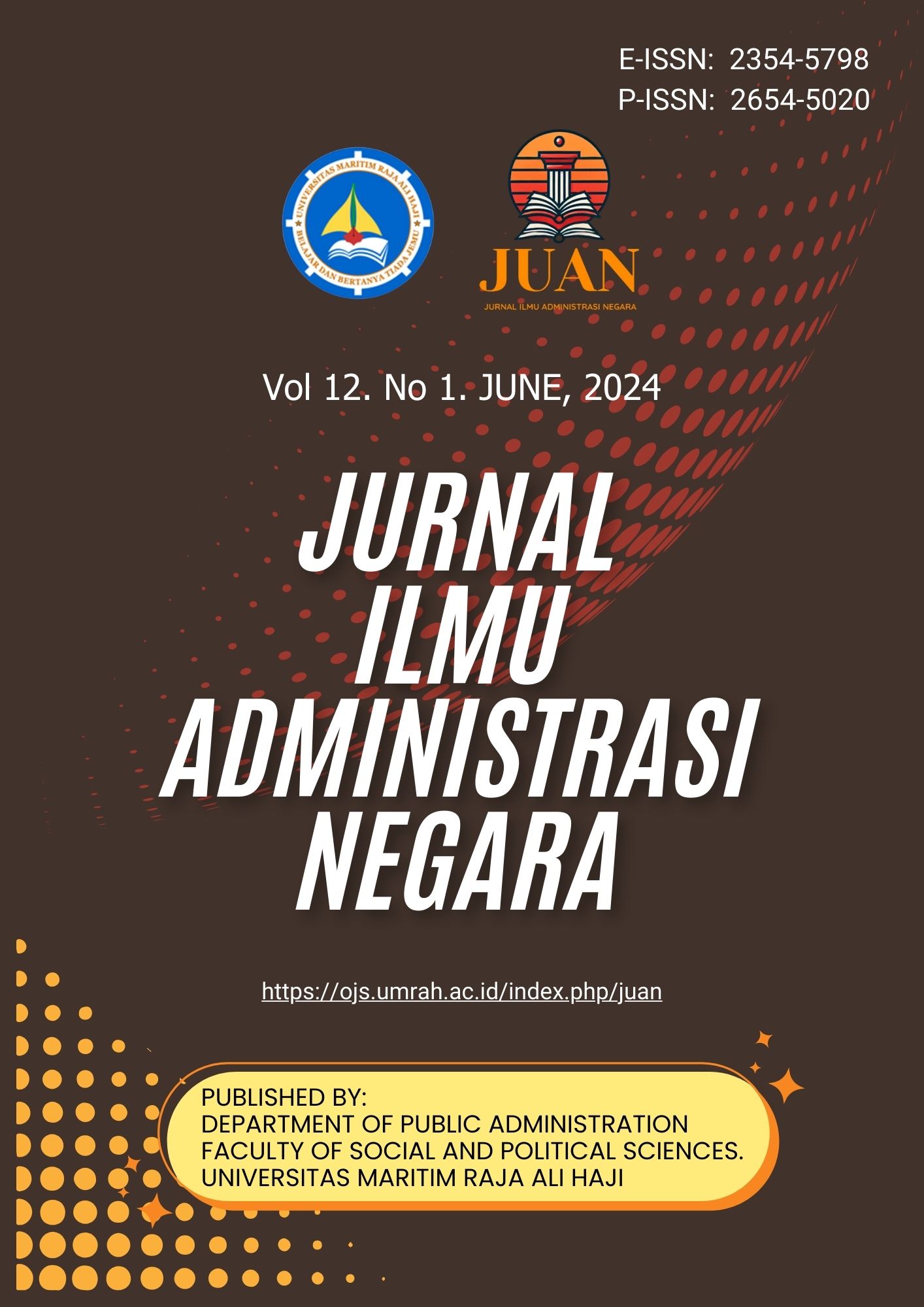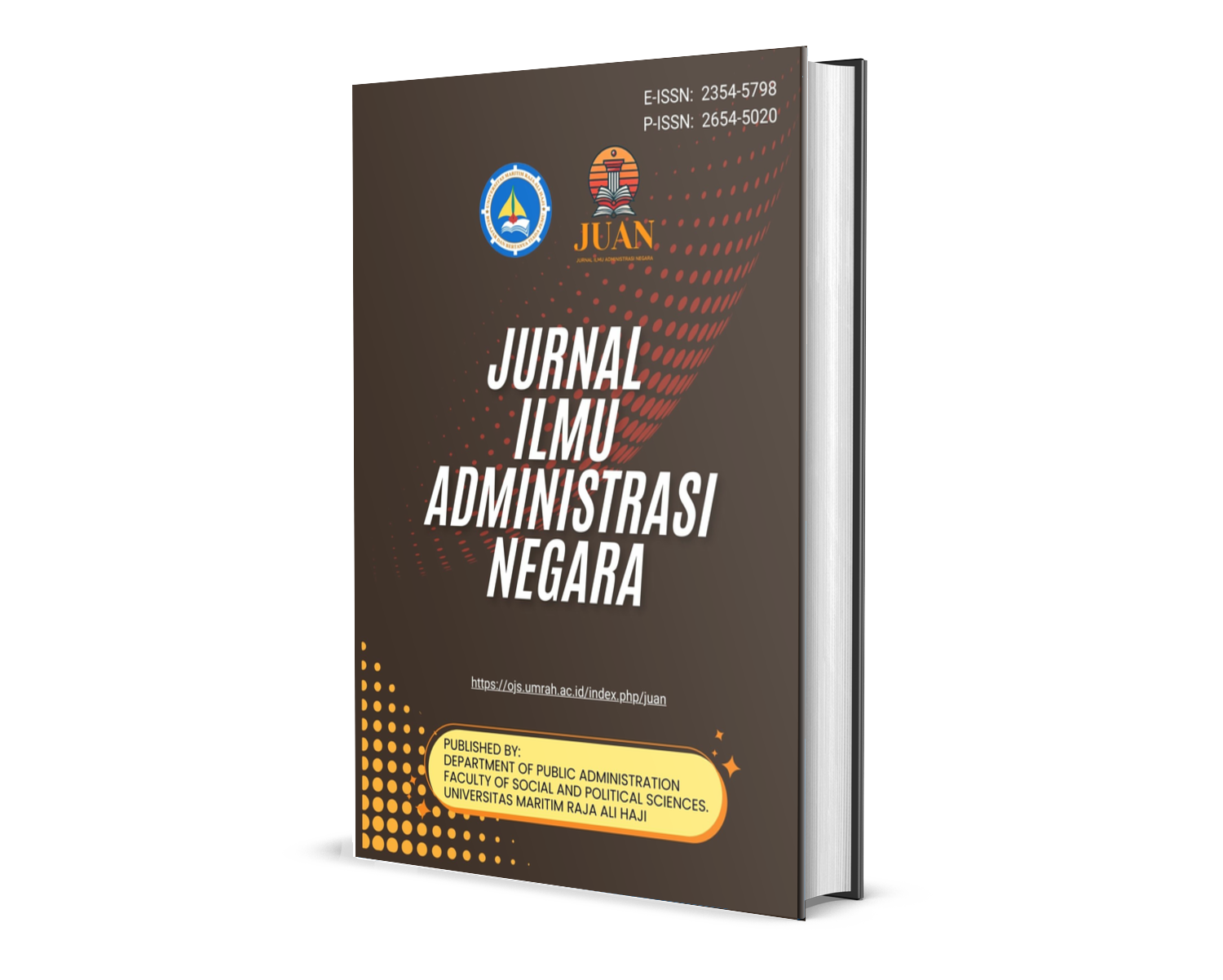Implementation of E-Government Jogja Smart Service in Building Jogja Smart City
DOI:
https://doi.org/10.31629/juan.v12i1.6952Keywords:
E-Government Implementation, Jogja Smart Service (JSS), Smart City DevelopmentAbstract
This research discusses the implementation of the Jogja Smart Service (JSS) application as part of the E-Government concept to realize Yogyakarta as a smart city. The background of this study lies in the need for efficient and integrated public services in the digital era. The primary objective of this research is to evaluate the effectiveness of the JSS application in improving the quality of public services in Yogyakarta, focusing on its implementation, challenges, and impacts. The study employs a descriptive qualitative approach, utilizing data collection techniques such as literature review, application observation, and secondary data analysis. The findings indicate that JSS provides various services, including population administration, health, education, and tourism, which are easily accessible through a digital platform. Since its launch in 2018, the application has recorded over 82,949 users, with 49,816 from Yogyakarta and 33,132 from outside the region. However, the research also identifies several challenges, such as limited public awareness of the application, digital divides, and a less appealing user interface design. In conclusion, although the JSS application has made significant contributions to supporting smart city development, further efforts are needed to improve public awareness, digital infrastructure, and feature innovation to ensure optimal usage by all citizens. With these steps, JSS holds great potential to support Yogyakarta in becoming a smart and livable city
References
Aisyah, A. (2022). Jogjaprov. go. id Website Management in Realizing Good Governance of the Special Government of Yogyakarta Period 2019. Journal of Islamic Communication and Counseling, 1(1), 41-55.
Albarkah, N. R., Tambun, A. P., Al Ghifari, W., Wihelmina, H. W., & Darmawan, I. (2023). Peningkatan Partisipasi Masyarakat dalam Pengambilan Kebijakan Publik Melalui E-Government. Madani: Jurnal Ilmiah Multidisiplin, 1(11).
Anggraini, A. T., & Iqbal, M. (2020). The utilization of Jogja smart service application: An E-Readiness Approach. Journal of Governance and Public Policy, 7(2), 150-159.
Government to Citizen Digital Interaction and Citizen to Government on the Jogja Smart Service Application. (2021). Jurnal Sains dan Teknologi, Vol 13, 90-96.
Gumilar, M. G. (2019). Inovasi Pemerintah Daerah Jogja Smart Service Dalam Menciptakan Smart And Liveable City Di Kota Yogyakarta. Jurnal Gama Societa, 19 - 27.
Indriyani, N. W., Nurdiarti, R. P., & Nastain, M. (2022). Aksesibilitas dan Pemanfaatan Aplikasi “Jogja Smart Service†untuk Mewujudkan Good Governance. Jurnal Riset Public Relations, 75-84.
Kadewandana, D., & Kaligis, R. A. (2024). The Role of Information and Communication Technology (ICT) in E-Government: A Literature Review of Sustainable Development Aspects. CoverAge: Journal of Strategic Communication, 14(2), 91-101.
M. Edi Saputra, Agnes Chandra Kirana, Rama Danti, Firdausy Andika Wighuna, Puji Lestari, & Baby Ana Retno Utami. (2023). Penyusunan Instrumen Kebijakan Smart City (Studi Program Jogja Smart Service Di Kota Yogyakarta). Gudang Jurnal Multidisiplin Ilmu, 1(6), 23–29. https://doi.org/10.59435/gjmi.v1i6.148
Novriando, A., Purnomo, E. P., & Salsabila, L. (2020). Efektivitas "Jogja Smart Service" Terhadap Pelayanan Publik di Kota Yogyakarta. Jurnal Ilmu Pemerintahan, 13, 68-75. https://doi.org/10.31947/jgov.v13i2.8817
Nugroho, R. A., & Septiana, A. A. M. (2023). EVALUATION OF LOCAL GOVERNMENT CAPACITY IN SUPPORTING SMART GOVERNMENT ASPECTS (SAMARINDA CITY CASE STUDY). INDONESIAN GOVERNANCE JOURNAL: KAJIAN POLITIK-PEMERINTAHAN, 6(1), 37-44.
Pratama, N. B. (2018). Pengembangan Konsep Smart City Melalui Aplikasi Smart Jogja Service Di Pemerintahan Kota Yogyakarta.
Radjikan, R., & Intan Pramesti, E. (2021). PENGARUH PENERAPAN SMART SOCIETY TERHADAP PELAYANAN MASYARAKAT DI DAERAH ISTIMEWA YOGYAKARTA. PRAJA Observer: Jurnal Penelitian Administrasi Publik (e- ISSN: 2797-0469), 1(04), 160–165. Retrieved from https://aksiologi.org/index.php/praja/article/view/507
Retnowati, N. D., & Nugraheny, D. (2021). G2C (Government to Citizen) Digital Interaction And C2G (Citizen to Government) on The Jogja Smart Service Application. Sainstek: Jurnal Sains dan Teknologi, 13(2), 90-96.
Rusadi, E. Y. Smart City in Indonesia: A Concept Adaptation.
Saputra, M. E., Chandra, A., Danti, R., Lestari, P., Utami, B. A. R., & Andika, F. (2023). Penyusunan Instrumen Kebijakan Smart City (Studi Program Jogja Smart Service Di Kota Yogyakarta). Jurnal Multidisiplin Ilmu, Vol 1, 23-29. https://doi.org/10.59435/gjmi.v1i6.148
Sorongan, E., Sari, D. R., Kusno, H. S., & Zulfariansyah, M. (2023). Can Satisfaction Interventions Rise Interest in E-Government Service Adoption in Indonesia? The Extended Perspective of The TAM Model. JATISI (Jurnal Teknik Informatika dan Sistem Informasi), 10(1), 620-634.
Wibisono, B. S., & Handoko, S. (2020). Program Jogja Smart Service Dalam Meningkatkan Pelayanan Publik Berbasis Sosio-Kultural. Jurnal Kewarganegaraan, Vol. 4, 66 - 74.
Yogar, B. N. A., Mutiarin, D., & Saputro, M. N. C. E. (2023). Jogja Smart Service as a Digital Public Services: Based on Agile Governance Perspective. Jurnal Informatika & Teknologi, Vol 4, 105-113. https://doi.org/10.37373/infotech.v4i1.562
Downloads
Published
How to Cite
Issue
Section
License
Copyright (c) 2024 Nilna Muna, Nanda Salsabila, Vikko Hilmi Pradana

This work is licensed under a Creative Commons Attribution-ShareAlike 4.0 International License.
You are free to:
- Share — copy and redistribute the material in any medium or format for any purpose, even commercially.
- Adapt — remix, transform, and build upon the material for any purpose, even commercially.
- The licensor cannot revoke these freedoms as long as you follow the license terms.
Under the following terms:
- Attribution — You must give appropriate credit, provide a link to the license, and indicate if changes were made . You may do so in any reasonable manner, but not in any way that suggests the licensor endorses you or your use.
- ShareAlike — If you remix, transform, or build upon the material, you must distribute your contributions under the same license as the original.
- No additional restrictions — You may not apply legal terms or technological measures that legally restrict others from doing anything the license permits.














